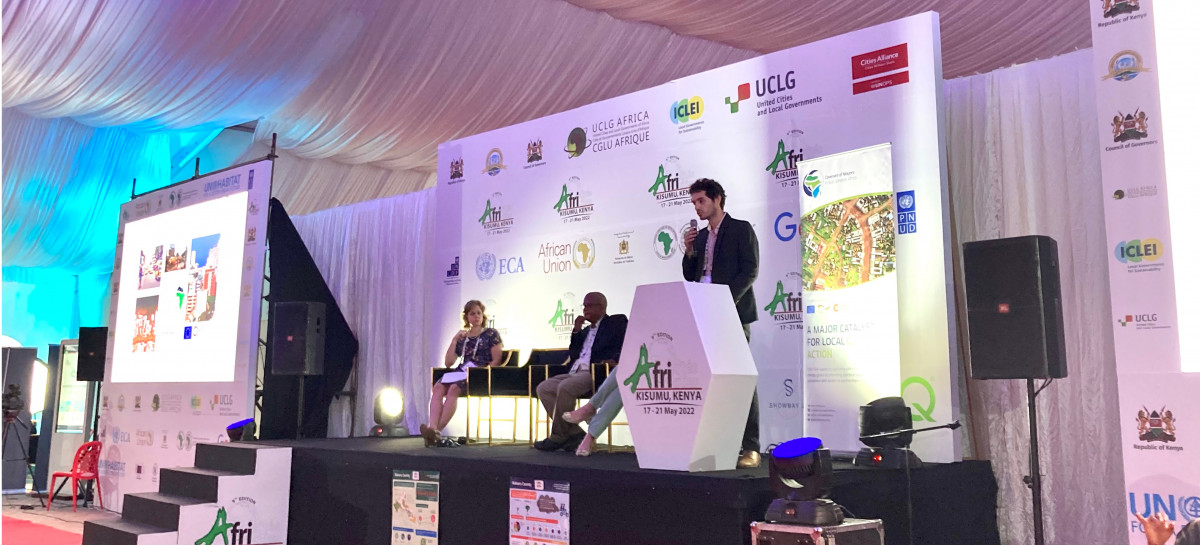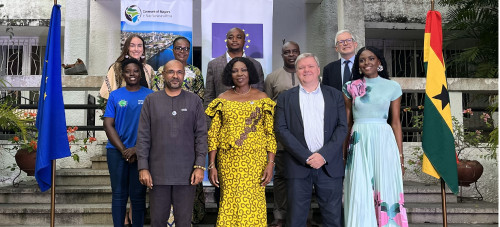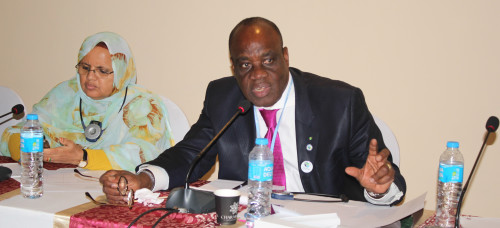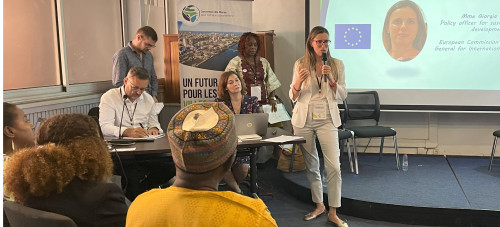Climate finance in Africa: Challenges and opportunities
Published: 9 Jun 2022

As part of the Africities 9 Summit the Covenant of Mayors in Sub-Saharan Africa hosted a session focused on climate finance for green infrastructure. While global investment in addressing climate change reached a record high of USD 612 billion in 2017, channeling this climate finance to the subnational level is administratively and politically challenging for local governments in Africa is an ongoing challenge.
Africa contributes the least to total global greenhouse gas (GHG) emissions, only about 4 percent, but it is the most vulnerable continent to the impacts of climate change. Last year at COP26, African leaders, in limited numbers, appealed for support calling for local-level climate finance to be unlocked and for an increase in funding for adaptation projects. However, despite these urgent calls, few of these requests feature in the Glasgow Climate Pact.
Mr GuIlly Moustache, Principal Officer, Energy Information and Coordination at the Seychelles Energy Commission, explained that tackling climate change is a major priority. Seychelles as a Small Island Developing States (SIDS) is particularly vulnerable to the effects of climate change, for example, wide-scale flooding, fiercer tropical storms, severe prolonged drought and depleting fish stocks.
Under its climate policy, Seychelles not only pledges to generate 15% of its power from renewable energy sources by 2030 building UP to 100% by 2050. Seychelles also promises to cut overall GHG emissions from its energy sector by 293.8 ktCO2e (26.4%) by 2030. In order to achieve these bold climate ambitions, funding is needed. Mr Moustache said the cost of priority mitigation actions is estimated to be a minimum of USD 331.5 million, while the estimated cost of adaptation actions is expected to exceed USD 295 million.
Though unlocking climate finance in Africa is a continued difficulty governments face, there are programmes in-place to provide this critical financing.
Mr Gautier Kohler, Task Team leader for Urban Development in East Africa at Agence Française de Développement (AFD) elaborated on the organisation’s Cities and Climate in Sub-Saharan Africa (CICLIA) facility. The CICLIA facility, initiated by the European Union, SECO and AFD in 2017, aims to provide support to cities in sub-Saharan Africa for the preparation of resilient, low-carbon urban projects by financing urban strategies, feasibility studies and technical assistance across sectors. Mr Kohler said the facility is currently working with 38 cities across 17 countries in the region, for example, in Kampala (Uganda) and Cape Town (South Africa) where the energy sector is the focus.
CICLIA aims to maximize the climate co-benefits of urban projects, define and disseminate national and local climate strategies for concrete investments with territorial benefits and reinforce the capacity of local governments to implement resilient, low-carbon urban projects.
Ms Giorgia Rambelli, Coordinator for Climate Policy and Energy Governance at ICLEI Europe presented another funding opportunity for local governments, Transformation Actions Program (TAP). TAP is a project pipeline and project preparation facility developed by ICLEI and partners which acts as an incubator to support local and regional governments by “catalysing capital flows for low-to-no emission and climate-resilient development.” The facility currently has over 70 projects in the pipeline, of which 32 are in Africa in the energy, water and waste sectors.
The Global Covenant of Mayors for Climate and Energy and CoM SSA are both partners to the TAP facility.
Johanna Granados Alcala, City Resilience and Climate Finance Advisor at GCoM, spoke about the impact of the Gulbenkian Prize for Humanity awarded to GCoM last year along with one million Euros to finance projects in Sub-Saharan Africa. These projects focus on empowering young people and women as well as the important role of local decision makers. In Senegal through these projects the supply of drinking water will be improved while in Cameroon, the city of Garoua will be awarded funds to support the development of energy efficiency solutions.
Financing is necessary to accelerate climate action in Africa and although the odds are in many ways stacked against local governments there are opportunities to unlock this much-needed finance. CoM SSA signatories through the CoM SSA Signatories Portal have access to a Funding Opportunities widget to help them find opportunities tailored to their needs. CoM SSA signatories can sign up to the Portal here. Contact: technicalhelpdesk@comssa.org for more information.
For more information about our session at Africities: waste management session, SEACAP session and CoM SSA open plenary.





